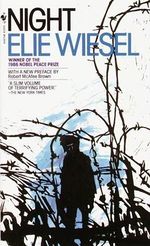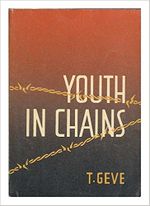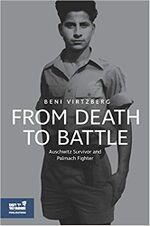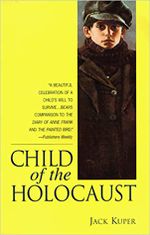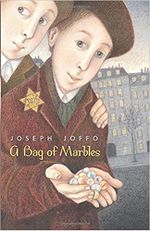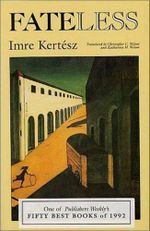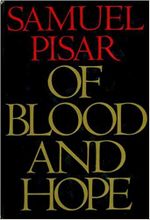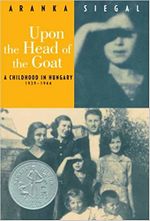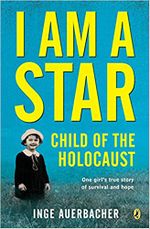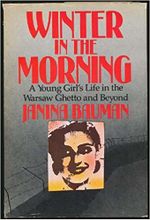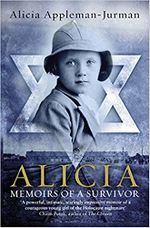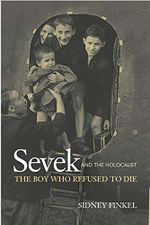Difference between revisions of "Category:Holocaust Children's Memoirs (subject)"
(→1956) |
(→1986) |
||
| Line 150: | Line 150: | ||
"The coming-of-age of a young girl during World War II. She was born to a wealthy doctor, then she and her family were rounded up and imprisoned in the Warsaw Ghetto to live a disease-ridden, hand-to-mouth existence, always in the presence of death. The family then escaped to the "Aryan" side where they had to slip from one safe-house to another, in constant fear of discovery and under the constant threat of blackmail ... Janina Bauman was a year older than Anne Frank when the Second World War began but, unlike The Diary of Anne Frank, this is a story of survival. When Hitler's decree forced her family into the Warsaw Ghetto, Janina, an intelligent, lively girl, suddenly found herself in a cramped flat, hiding with other Jewish families. At first even curfews and the casual cruelty meted out by the German occupiers could not dim her passion for books, boys and romance. Then came the raids, and Janina, with her sister and mother, had to keep on the move, hiding in the ruins of the ghetto to avoid being one of thousands rounded up every day and deported to the camps. Their escape to the 'Aryan' side was followed by two years in hiding, taking shelter with those willing to help them and living in constant fear of betrayal. Told through her teenage diaries, giving her story a rare immediacy, this is the extraordinary tale of a passionate young woman's courage and survival."--Publisher description. | "The coming-of-age of a young girl during World War II. She was born to a wealthy doctor, then she and her family were rounded up and imprisoned in the Warsaw Ghetto to live a disease-ridden, hand-to-mouth existence, always in the presence of death. The family then escaped to the "Aryan" side where they had to slip from one safe-house to another, in constant fear of discovery and under the constant threat of blackmail ... Janina Bauman was a year older than Anne Frank when the Second World War began but, unlike The Diary of Anne Frank, this is a story of survival. When Hitler's decree forced her family into the Warsaw Ghetto, Janina, an intelligent, lively girl, suddenly found herself in a cramped flat, hiding with other Jewish families. At first even curfews and the casual cruelty meted out by the German occupiers could not dim her passion for books, boys and romance. Then came the raids, and Janina, with her sister and mother, had to keep on the move, hiding in the ruins of the ghetto to avoid being one of thousands rounded up every day and deported to the camps. Their escape to the 'Aryan' side was followed by two years in hiding, taking shelter with those willing to help them and living in constant fear of betrayal. Told through her teenage diaries, giving her story a rare immediacy, this is the extraordinary tale of a passionate young woman's courage and survival."--Publisher description. | ||
====1988==== | |||
[[File:1988 Appleman.jpg|thumb|left|150px]] | |||
'''Alicia''' (Toronto, and New York : Bantam Books, 1988) is the memoir written by Holocaust survivor [[Alicia Appleman-Jurman]] (1930-2017). | |||
"Her name is Alicia. She was five-years-old when her story begins. It is 1935 and she is living in the East Polish town of Buczacz. Although brought up in an atmosphere of anti-Semitism, nothing could prepare this young girl for the Russian invasion of Poland and the full horror of the Nazi Occupation. | |||
When Alicia was thirteen, she fled the Nazis through the forests and fields of Poland. Despite her youth, she rescued other Jews from the grip of the Gestapo. At the end of the war, Alicia, whose parents and four brothers had all perished in the Holocaust, risked her life again – this time leading other survivors from Poland to Palestine through an underground route. Her capacity for heroism in the face of brutality and evil shines through, and her story cannot easily be forgotten. She swore on her brother's grave that if she survived, she would speak for her silenced family. This book is the eloquent fulfillment of that oath. ... Told simply and modestly, this is a remarkable tribute to courage and determination, and how one young woman survived the horrors of war-torn Europe."--Publisher description. | |||
[[Alicia Appleman-Jurman]] (1930-2017). | |||
Revision as of 12:31, 21 January 2020
Holocaust Children's Memoirs
1950s
1956
The Night (New York: Hill & Wang; and London: MacGibbon & Kee, 1960) is the memoir written by Holocaust survivor Elie Wiesel (1928-2016). Originally published in Yiddish, Un di Velt Hot Geshvign (1956), then in French, La Nuit (1958).
"Night is Elie Wiesel's masterpiece, a candid, horrific, and deeply poignant autobiographical account of his survival as a teenager in the Nazi death camps. This new translation by Marion Wiesel, Elie's wife and frequent translator, presents this seminal memoir in the language and spirit truest to the author's original intent. And in a substantive new preface, Elie reflects on the enduring importance of Night and his lifelong, passionate dedication to ensuring that the world never forgets man's capacity for inhumanity to man ... Night offers much more than a litany of the daily terrors, everyday perversions, and rampant sadism at Auschwitz and Buchenwald; it also eloquently addresses many of the philosophical as well as personal questions implicit in any serious consideration of what the Holocaust was, what it meant, and what its legacy is and will be."--Publisher description.
Elie Wiesel (1928-2016) was born in Sighet in Romania. He was 15 when in March 1944 his family, along with the rest of the town's Jewish population, was placed in one of the two confinement ghettos set up in Sighet. In May 1944, the Hungarian authorities, under German pressure, began to deport the Jewish community to the Auschwitz concentration camp. He lost his parents and his younger sister. Elie was eventually taken to Buchenwald, where he survived until liberation ... After World War II ended and Wiesel was freed, he joined a transport of 1,000 child survivors of Buchenwald to Ecouis, France, where the Œuvre de secours aux enfants (OSE) had set up a rehabilitation center. He was there reunited to his older sisters, who also had survived. Wiesel learned French and studied literature, philosophy and psychology at the Sorbonne. He began working as a journalist. At the invitation of the French author and Nobel Price François Mauriac, who had became a close friend of his, he wrote a 900-page memoir Un di velt hot geshvign (And the World Remained Silent) in Yiddish, which was published in abridged form in Buenos Aires in 1956. A shortened form (La nuit) appeared in French in 1958 ... In 1955, Wiesel moved to New York. The English version of his memoir was published in 1960 and became an international bestseller. From 1972 to 1976 Weisel was a Distinguished Professor at the City University of New York and since 1976 a professor of the Humanities at Boston University, which created the Elie Wiesel Center for Jewish Studies in his honor. He was involved with Jewish causes and human rights causes and helped establish the United States Holocaust Memorial Museum in Washington, DC. In 1986 he was awarded the Nobel Peace Prize ... Died in 2016 in New York.
1958
Youth in Chains (Jerusalem : R. Mass, 1958) is the memoir written by Holocaust survivor Thomas Geve (b.1929).
"The vivid, true, intimate story of Europe's youth under the heel of Fascism, their joys and sufferings, their day-to-day life and dreams -- told for the first time by one of them ... The author was taken to Auschwitz in 1942 when he was 13 years old and spent a total of 22 months in Auschwitz and Buchenwald before he was freed by the Allies in April 1945."--Publisher description.
Thomas Geve (b.1929) was born in Stettin and raised in Germany. During the war years, he worked for some months as a gravedigger at the Weißensee Cemetery. He was deported to Auschwitz in June 1943 with his mother who perished in the camp. He stayed in Auschwitz till its evacuation in January 1945, after which he still survived the death march, Gross-Rosen concentration camp and Buchenwald concentration camp until liberation in April 1945. Too weak to leave the camp, he proceeded to record camp life in 79 different drawings, before moving to a camp in Switzerland for orphaned shoah survivors. When his father was located, he was reunited with him in England. In 1950 he emigrated to Israel and settled in Haifa.
1959
Chi ti ama così <Italian> (Milan: Lerici, 1959) is the memoir written by Holocaust survivor Edith Bruck (b.1932). Translated into English: Who Loves You Like This (2001).
"Passover, 1944. Edith Bruck's family sits in a darkened kitchen isolated from the other villagers by the black cloth on the window, their poverty, and their Judaism. Her mother explains that the Germans have reached their Hungarian village—that they will soon have to endure more than the cries of "Jewstink" and the deprivations that have been their lot for months. The next morning twelve-year-old Edith is roused by shouts of "Wake up! Outside! Quickly! I give you five minutes, you animals!" ... In this memoir, Bruck tells the story of her imprisonment in Auschwitz, Dachau, and Bergen-Belsen. She and her older sister endure almost untellable horrors, and hunger so savage that the author tells of ripping bread from another's teeth. The end of the war brings freedom but little security. With no parents and no home, she moves from country to country, from household to household, and from relationship to relationship. In search of peace she and other family members immigrate to Israel, but even there peace eludes her. Bruck avoids both sentimentality and cynicism; she sees with clarity and passion, learns what she needs to survive, and catalogs other lessons for future use. At the end of Who Loves You Like This, she leaves Israel for Rome, where she lives today. In another country and in a foreign language, she finds the words to describe her life—without homeland, family, or native language."--Publisher description.
Edith Bruck (b.1932) was born in Hungary, the daughter of poor Jewish parents. In 1944, with her parents, and two brothers and a sister, she was sent to Auschwitz, where her mother died. The family was transferred to Dachau where her father died, then to Christianstadt and finally Bergen-Belsen, where the remaining children were liberated by the Allies in 1945. After returning to Hungary and then moving to Israel, she finally settled in Rome, Italy, since 1954. She embraced Italian as her new language. The wife of Italian writer and film director Nelo Risi, Bruck is the author of several novels, collections of short stories, and volumes of poetry. She writes for radio and television and has directed several films. Her works—for which she has won numerous literary prizes—have been translated from the original Italian into Dutch, German, Swedish, and Hungarian.
1960s
1967
Milayl Habedolah Ve'ad Laylot Hakrav [From Kristallnacht to the Nights of Battle] (Jerusalem: Masada Press, 1967) is the memoir written by Holocaust survivor Beni Virtzberg (1928-1968). Translated into English: From Death to Battle: Auschwitz Survivor and Palmach Fighter (Jerusalem: Yad Vashem, 2017).
"When Beni Virtzberg was 9 years old, Kristallnacht destroyed his carefree childhood in his home town of Hamburg. Along with his parents, he was transported to Sosnowiec. Nazi Germany invaded Poland and the family shared the fate of many other Jews: internment in a ghetto, followed by deportation to Auschwitz. Beni's mother was murdered upon arrival. The young boy bravely fought to save his father's life, but he ultimately lost him as well. Beni's own fight for survival led him from Auschwitz, where he was forced to assist Joseph Mengele, to the death marches and to the notorious camps of Mauthausen and Melk. Upon liberation, Beni immigrated to Eretz Israel, joined the Palmach, and fought in some of the fiercest battles during Israel's War of Independence. During the Eichmann Trial, Beni decided to bear witness by writing his painful memoirs. The work on the book and the constant reminders of his agonizing past and losses took a great toll on him. On August 4, 1968, Beni Virtzberg took his own life."--Publisher description.
Beni Virtzberg (1928-1968) was born in Germany. In 1939 the family moved to Poland, but only to find themselves under German occupation. After living in the Sosnowiec and Środula ghetto, they were deported to Auschwitz. Beni only survived serving as Mengele's personal servant and errand boy. Forced into a death march, he arrived to Mauthausen and Melk until liberation. He moved to Israel in November 1945. Served in the army during the Israel's War of Independence and then worked for the Jewish National Fund as a forester. In 1967 he published his memoir but plagued with depression, took his own life.
1967
Child of the Holocaust (London: Routledge & K. Paul, 1967) is the memoir written by Holocaust survivor Jack Kuper (b.1932).
"Offers the true account of an eight-year-old boy who returned to his Polish town one day to find that all the Jews had been sent away and describes his young years traveling fearfully around the country in the hopes of finding his people and a place to call home."--Publisher description.
Jack Kuper (Jankele Kuperblum; b.1932) survived the war alone as a street child, disguised for years as a Polish peasant and a Christian to escape the horrors of the Holocaust. After liberation he was placed in a Jewish orphanage in Lublin, Poland. He had to learn how to be a Jew again. During the years in hiding he had forgotten his language, culture and religion. In 1947, he was brought to Halifax by Canada’s Jewish community. He ended up settling in Toronto and working at the CBC.
1970s
1973
Un Sac de billes <French> (1973) is the memoir written by Holocaust survivor Joseph Joffo (1931-2018).
English trans. A Bag of Marbles (Boston: Houghton Mifflin, 1974)
"When Joseph Joffo was ten years old, his father gave him and his brother fifty francs and instructions to flee Nazi-occupied Paris and, somehow, get to the south where France was free. Previously out of print, this book is a captivating and memorable story; readers will instinctively find themselves rooting for these children caught in the whirlwind of World War II.."--Publisher description.
Joseph Joffo (1931-2018).
1975
Sorstalanság <Hungarian> (1975) is the memoir written by Holocaust survivor Imre Kertész (1929-2016).
English trans. Fateless / Fatelessness (1992)
"At the age of 14 Georg Koves is plucked from his home in a Jewish section of Budapest and without any particular malice, placed on a train to Auschwitz. He does not understand the reason for his fate. He doesn’t particularly think of himself as Jewish. And his fellow prisoners, who decry his lack of Yiddish, keep telling him, “You are no Jew.” In the lowest circle of the Holocaust, Georg remains an outsider ... The genius of Imre Kertesz’s unblinking novel lies in its refusal to mitigate the strangeness of its events, not least of which is Georg’s dogmatic insistence on making sense of what he witnesses–or pretending that what he witnesses makes sense. Haunting, evocative, and all the more horrifying for its rigorous avoidance of sentiment, Fatelessness is a masterpiece in the traditions of Primo Levi, Elie Wiesel, and Tadeusz Borowski."--Publisher description.
Imre Kertész (1929-2016)
1978
Kinderjaren <Dutch> (1978) is the memoir written by Holocaust survivor Jona Oberski (b.1938).
English trans. Childhood. Garden City, NY: Doubleday, 1983 / repr. New York, NY: Penguin Books, 2014.
Translated into English, French, German, Italian, Spanish
"Told from the perspective of a child slowly awakening to the atrocities surrounding him, Childhood is a searing story of the Holocaust that no reader will soon forget. As five-year-old Jona waits with his mother and father to emigrate from Nazi-occupied Amsterdam to Palestine, they are awakened at night, put on a train, and eventually interred in the camps at Bergen-Belsen. There, what at first seems to be a merely dreary existence soon reveals itself to be one of the worst horrors humanity has ever created. A triumph of heartrending clarity and dispassionate amazement, Childhood stands tall alongside such monuments of Holocaust literature as The Diary of Anne Frank, Elie Wiesel’s Night, and Primo Levi’s Survival in Auschwitz."--Publisher description.
1979
Le sang de l'espoir <French> (Paris: Laffont, 1979) is a memoir written by Holocaust survivor Samuel Pisar (1929-2015).
English trans. Of Blood and Hope (Boston : Little, Brown, 1980).
"A survivor of Auschwitz recounts his harrowing experiences, his adjustment to freedom, and his work on behalf of the Jewish cause."--Publisher description.
Samuel Pisar (1929-2015)
1980s
1981
האי ברחוב הציפורי <Hebrew> (Jerusalem: 1981) is a semi-autobiographical novel written by Holocaust survivor Uri Orlev (b.1931).
English trans. The Island on Bird Street (Boston, MA: Houghton Mifflin, 1984).
"During World War II a Jewish boy is left on his own for months in a ruined house in the Warsaw Ghetto, where he must learn all the tricks of survival under constantly life-threatening conditions."--Publisher description.
Uri Orlev (b.1931)
1981
Upon the Head of the Goat: A Childhood in Hungary (New York, NY: Farrar Straus Giroux, 1981) is a memoir written by Holocaust survivor Aranka Siegal (b.1930).
"The classic true story of one child's experiences during the holocaust, who witnesses the destruction of her family at the hands of the Nazis during World War II ... Nine-year-old Piri describes the bewilderment of being a Jewish child during the 1939-1944 German occupation of her hometown (then in Hungary and now in the Ukraine) and relates the ordeal of trying to survive in the ghetto ... Upon the Head of the Goat is the winner of the 1982 Boston Globe - Horn Book Award for Nonfiction and a 1982 Newbery Honor Book."--Publisher description.
Aranka Siegal (b.1930).
1986
I Am a Star: Child of the Holocaust (New York, NY: Prentice-Hall Books for Young Readers, 1986) is the memoir written by Holocaust survivor Inge Auerbacher (b.1934).
"The author's reminiscences about her childhood in Germany, years of which were spent in a Nazi concentration camp. Includes several of her original poems ... Inge Auerbacher’s childhood was as happy and peaceful as that of any other German child—until 1942. By then, the Nazis were in power, and because Inge’s family was Jewish, she and her parents with sent to a concentration camp in Czechoslovakia. The Auerbachers defied death for three years, and were finally freed in 1945. In her own words, Inge Auerbacher tells her family’s harrowing story—and how they carried with them ever after the strength and courage of will that allowed them to survive."--Publisher description.
Inge Auerbacher (b.1934)
1986
Winter in the Morning: a young girl's life in the Warsaw ghetto and beyond (1986) is the memoir written by Holocaust survivor Janina Bauman (b.19).
"The coming-of-age of a young girl during World War II. She was born to a wealthy doctor, then she and her family were rounded up and imprisoned in the Warsaw Ghetto to live a disease-ridden, hand-to-mouth existence, always in the presence of death. The family then escaped to the "Aryan" side where they had to slip from one safe-house to another, in constant fear of discovery and under the constant threat of blackmail ... Janina Bauman was a year older than Anne Frank when the Second World War began but, unlike The Diary of Anne Frank, this is a story of survival. When Hitler's decree forced her family into the Warsaw Ghetto, Janina, an intelligent, lively girl, suddenly found herself in a cramped flat, hiding with other Jewish families. At first even curfews and the casual cruelty meted out by the German occupiers could not dim her passion for books, boys and romance. Then came the raids, and Janina, with her sister and mother, had to keep on the move, hiding in the ruins of the ghetto to avoid being one of thousands rounded up every day and deported to the camps. Their escape to the 'Aryan' side was followed by two years in hiding, taking shelter with those willing to help them and living in constant fear of betrayal. Told through her teenage diaries, giving her story a rare immediacy, this is the extraordinary tale of a passionate young woman's courage and survival."--Publisher description.
1988
Alicia (Toronto, and New York : Bantam Books, 1988) is the memoir written by Holocaust survivor Alicia Appleman-Jurman (1930-2017).
"Her name is Alicia. She was five-years-old when her story begins. It is 1935 and she is living in the East Polish town of Buczacz. Although brought up in an atmosphere of anti-Semitism, nothing could prepare this young girl for the Russian invasion of Poland and the full horror of the Nazi Occupation. When Alicia was thirteen, she fled the Nazis through the forests and fields of Poland. Despite her youth, she rescued other Jews from the grip of the Gestapo. At the end of the war, Alicia, whose parents and four brothers had all perished in the Holocaust, risked her life again – this time leading other survivors from Poland to Palestine through an underground route. Her capacity for heroism in the face of brutality and evil shines through, and her story cannot easily be forgotten. She swore on her brother's grave that if she survived, she would speak for her silenced family. This book is the eloquent fulfillment of that oath. ... Told simply and modestly, this is a remarkable tribute to courage and determination, and how one young woman survived the horrors of war-torn Europe."--Publisher description.
Alicia Appleman-Jurman (1930-2017).
2000s
2006
Sevek and the Holocaust: The Boy Who Refused to Die (Matteson, Ill. : Sidney Finkel, 2006) is the memoir written by Holocaust survivor Sidney Finkel (Sevek Finkel; b.1931).
"Sidney “Sevek” Finkel is the author of Sevek and the Holocaust, The Boy Who Refused to Die. This Holocaust memoir is told from the perspective of eight-year-old Sevek, capturing the emotions of a boy who loses his home, his family and ultimately his humanity by the time he reaches the age of fourteen. He lived in a cramped and disease-ridden ghetto, saw his family murdered, endured the horrors of the Treblinka death camp, ate grass for survival in the final days before reaching freedom, and, finally, resumed his education in a foreign country after a six-year lapse. This 2nd Edition includes a new chapter about Sevek's return to Buchenwald 66 years after liberation, as well as new-found information learned during this visit. This book has been used as part of the Holocaust curriculum in hundreds of middle schools across the country, and Finkel has shared his story with thousands of students, relaying a message of tolerance, hope and love. Sevek and the Holocaust, The Boy Who Refused to Die received positive reviews from the Kirkus Review and Writer’s Digest. Sidney Finkel received the Philip K Weiss Award for Storytelling for Peace and Human Rights in 2013."--Publisher description.
Sidney Finkel (b.1931)
2010s
- [[Helga Weiss (1929)
- Ana Novac (b.1929)
- Renata Calverley (b.1937c) wrote Let Me Tell You a Story: One Girl's Escape from the Nazis.
Eva Schloss (1929-)
Pages in category "Holocaust Children's Memoirs (subject)"
The following 171 pages are in this category, out of 171 total.
1
- Ruth Minsky Sender / Riva Minska (F / Poland, 1926), Holocaust survivor
- Laura Varon (F / Rhodes, 1926), Holocaust survivor
- Matylda Weinfeld / Miriam Akavia (F / Poland, 1927-2015), Holocaust survivor
- Ursula Bacon (F / Germany, 1927)
- Bill Basch
- Tomasz Blatt (M / Poland, 1927-2015), Holocaust survivor
- Henri Borlant (M / France, 1927), Holocaust survivor
- Dov Freiberg (M / Poland, 1927-2008), Holocaust survivor
- Jack Gruener
- Marek Herman (M / Poland, Italy, 1927), Holocaust survivor
- Clara Kramer (F / Poland, 1927-2018), Holocaust survivor
- Henri Landwirth (M / Belgium, 1927-2018), Holocaust survivor
- Esther Nisenthal Krinitz
- Moyshe Rekhtman
- Zuzana Růžičková (Czechia, 1927-2017), Holocuast survivor
- John G. Stoessinger (M / Austria, 1927-2017), Holocaust survivor
- Chanania Teitel / Hannan Dekel (M / Poland, 1927-1993), Holocaust survivor
- Sara Zyskind / Sara Rachela Plagier (F / Poland, 1927-1995), Holocaust survivor
- Wolfgang Adler
- Eliezer Ayalon / Lejzor Herschenfin (M / Poland, 1927), Holocaust survivor
- George Brady / Jiří Brady (M / Czechia, 1928-2019), Holocaust survivor
- Ilse Charny (F / Austria, 1928), Holocaust survivor
- Vera Diament / Vera Gissing (F / Czechia, 1928), Holocaust survivor
- Gerhard Durlacher
- Ben Edelbaum (M / Poland, 1928-1990), Holocaust survivor
- David Faber (M / Poland, 1928-2015), Holocaust survivor
- Luigi Fleischmann (M / Italy, 1928), Holocaust survivor
- Roman Frister
- Solly Ganor (M / Lithuania, 1928), Holocaust survivor
- Petr Ginz (M / Czechia, 1928-1944), Holocaust victim
- Heinz Goldstein / Henry Gallant (M / Germany, 1928-2019), Holocaust survivor
- Arek Herszlikowicz / Arek Hersh (M / Poland, 1928), Holocaust survivor
- Hanna Kugler Weiss (F / Italy, 1928), Holocaust survivor
- Tom Lantos (M / Hungary, 1928-2008), Holocaust survivor
- Nate Leipciger (M / Poland, 1928), Holocaust survivor
- Marceline Loridan-Ivens / Marceline Rozenberg (F / France, 1928-2018), Holocaust survival
- Hanna Pankowsky / Hanna Davidson (F / Poland, 1928-2020), Holocaust survivor
- Gilberto Salmoni (M / Italy, 1928), Holocaust survivor
- Davide Schiffer (M / Italy, 1928-2020), Holocaust survivor
- Alberto Sed (M / Italy, 1928), Holocaust survivor
- Lore Segal / Lore Groszmann (F / Austria, 1928), Holocaust survivor
- Martin Spett (M / Poland, 1928-2019), Holocaust survivor
- Beni Virtzberg (M / Germany, Poland, 1928-1968), Holocaust survivor
- Felix Weinberg (M / Czechia, 1928-2012), Holocaust survivor
- Elie Wiesel (M / Romania, 1928-2016), Holocaust survivor
- Edith Balas
- Becky Behar (F / Turkey, Italy, 1929-2009), Holocaust survivor
- Andre Berkover
- Margit Buchhalter Feldman (F / Hungary, 1929-2020), Holocaust survivor
- Ruth David (F / Germany, 1929-2020), Holocaust survivor
- Cordelia Edvardson
- Rena Finder (Poland, 1929), Holocaust survivor
- Thomas Geve / Stefan Cohn (M / Germany, 1929), Holocaust survivor
- Elly Gross
- Samuel Hoffman / Martin Hoffman (M / Czechia, 1929-2018), Holocaust survivor
- Simon Jeruchim (M / France, 1929), Holocaust survivor
- Imre Kertész (M / Hungary, 1929-2016), Holocaust survivor
- Ilse Koehn
- Akiva Kohane (M / Poland, 1929), Holocaust survivor
- Estelle Laughlin / Estelle Wakszlak (F / Poland, 1929), Holocaust survivor
- Samuel Pisar (M / Poland, 1929-2015), Holocaust survivor
- Eva Schloss / Eva Geiringer (F / Netherlands, 1929), Holocaust survivor
- Judita Stern / Judith Sherman (F / Slovakia, 1929), Holocaust survivor
- Alicia Weinsberg / Alicja Fajnsztejn (F / Poland, 1929), Holocaust survivor
- Helga Weiss / Helga Hošková-Weissová (F / Czechia, 1929), Holocaust survivor
- Irene Zisblatt
- Janina David
- Cesare Moise Finzi (M / Italy, 1930), Holocaust survivor
- Michael Gruenbaum (M / Czechia, 1930)
- Bertrand Herz (France, 1930)
- Ingrid Kisliuk / Inge Scheer (F / Austria, 1930-2020), Holocaust survivor
- Michal Kraus (M / Czechia, 1930), Holocaust survivor
- Hans Helmut Michel (M / Germany, France, 1930-1944), Holocaust victim
- Sami Modiano (M / Rhodes, 1930), Holocaust survivor
- Yehuda Nir / Juliusz Gruenfeld (M / Poland, 1930-2014), Holocaust survivor
- Josef Perl (M / Slovakia, 1930), Holocaust survivor
- Helga Pollak-Kinsky (F / Austria, 1930), Holocaust survivor
- Aranka Siegal / Aranka Meizlik (F / Hungary, 1930), Holocaust survivor
- Marianne Spier-Donati (F / Germany, 1930), Holocaust survivor
- Regina Steinitz
- Ela Weissberger / Ela Stein (F / Czechia, 1930-2018), Holocaust survivor
- Esther Werkendam / Hetty Verolme (F / Netherlands, 1930), Holocaust survivor
- Leo Michel Abrami (M / France, 1931), Holocaust survivor
- Livia Bitton-Jackson / Elli L. Friedmann (F / Czechia, 1931), Holocaust survivor
- Hana Brady / Hanička Bradyová (F / Czechia, 1931-1944), Holocaust victim
- Sevek Finkelstein / Sidney Finkel (M / Poland, 1931), Holocaust survivor
- Simon Gronowski (M / Belgium, 1931), Holocaust survivor
- Suzanne Gross / Sarah Pertofsky (F / France, 1931), Holocaust survivor
- Renée Kann Silver (F / Germany, 1931), Holocaust survivor
- Ruth Klüger (Austria, 1931), Holocaust survivor
- Lia Levi (F / Italy, 1931), Holocaust survivor
- Stephen Nasser
- Emanuele Pacifici (M / Italy, 1931-2014), Holocaust survivor
- Mikulas Reichental (M / Slovakia, 1931), Holocaust survivor
- Josef Rosenbaum (M / Germany, 1931), Holocaust survivor
- Fatina Sed (F / Italy, 1931), Holocaust survivor
- Eva Slonim / Eva Weiss (F / Slovakia, 1931), Holocaust survivor
- Regina Teitel / Rivka Dekel (F / Poland, 1931), Holocaust survivor
- Romek Wajsman / Robbie Waisman (M / Poland, 1931), Holocaust survivor
- Samuel Max Werkendam (M / Netherlands, 1931-2005), Holocaust survivor
- Sidney Zoltak (M / Poland, 1931), Holocaust survivor
- Aharon Appelfeld (M / Poland, 1932-2018), Holocaust survivor
- Albert Bigielman (M / France, 1932), Holocaust survivor
- Edith Bruck / Edith Steinschreiber (F / Hungary, 1932)
- Krystyna Carmi (F / Poland, 1932)
- Henry Foner / Heinz Lichtwitz (M / Germany, 1932), Holocaust survivor
- Saul Friedländer (France, 1932), Holocaust survivor
- Pinchas Gutter (M / Poland, 1932), Holocaust survivor
- Jack Kuper / Jankele Kuperblum (M / Poland, 1932), Holocaust survivor
- Regine Miller (F / Belgium, 1932), Holocaust survivor
- Edith Milton / Edith Cohn (F / Germany, 1932), Holocaust survivor
- Schoschana Rabinovici / Suzanne Weksler (F / Lithuania, 1932-2019), Holocaust survivor
- Johanna Reiss (Netherlands, 1932), Holocaust survivor
- Cesare Rimini (M / Italy, 1932), Holocaust survivor
- Rolf Spier-Donati (M / Germany, 1932), Holocaust survivor
- Arie Tamir (M / Poland, 1932), Holocaust survivor
- Louis Begley / Ludwik Begleiter (M / Poland, 1933), Holocaust survivor
- Roman Ferber
- Annette Muller (F / France, 1933), Holocaust survivor
- Naomi Samson / Naomi Rosenberg (F / Poland, 1933), Holocaust survivor
- Arianna Szörényi (F / Italy, 1933), Holocaust survivor
- Zadok Jack Werkendam (M / Netherlands, 1933-2003), Holocaust survivor
- Aldo Zargani (M / Italy, 1933), Holocaust survivor
- Inge Auerbacher (F / Germany, 1934), Holocaust survivor
- Thomas Buergenthal (Poland, 1934), Holocaust survivor
- Magda Denes (F / Hungary, 1934-1996), Holocaust survivor
- Michal Glowinski
- Anita Kempler / Anita Lobel (F / Poland, 1934), Holocaust survivor
- Eva & Miriam Mozes (Romania, 1934)
- Ruth Barnett / Ruth Michaelis (F / Germany, 1935), Holocaust survivor
- Amos Blas
- Marcel Braitstein (M / Belgium, 1935), Holocaust survivor
- Krystyna Chiger / Kristine Keren (F / Poland, 1935), Holocaust survivor
- Erna Gorman (F / Poland, 1935), Holocaust survivor
- Peter Nachemstein / Peter Nash (M / Germany, 1935), Holocaust survivor
- Rena Quint
- Tomi Reichental (M / Slovakia, 1935), Holocaust survivor
- Sylvia Rozines
- Nelly S. Toll
- Jytte Bornstein (F / Denmark, 1936), Holocaust survivor
- Shlomo Breznitz
- Felicia Bryn (F / Poland, 1936-2014), Holocaust survivor
- Cesare Frustaci
- Andrew S. Grove (M / Hungary, 1936-2016), Holocaust survivor
- Renzo Modiano (M / Italy, 1936), Holocaust survivor
- Jurek Becker (M / Poland, 1937-1997), Holocaust survivor
- Ruth Kapp Hartz (F / France, 1937), Holocaust survivor
- Rachel Hyams / Rutka Greenspan (F / Poland, 1937), Holocaust survivor
- Eva Lavi / Ewa Ratz (F / Poland, 1937), Holocaust survivor
- Marian Marzynski / Marian Kuszner (M / Poland, 1937), Holocaust survivor
- Tova Friedman (F / Poland, 1938), Holocaust survivor
- Marione Ingram (F / Germany, 1938), Holocaust survivor
- Francine Lazarus (F / Belgium, 1938), Holocaust survivor
- Roma Ligocka / Roma Liebling (F / Poland, 1938), Holocaust survivor
- Trudie Strobel (F / Ukraine, 1938), Holocaust survivor
- Pawel Chiger (M / Poland, 1939), Holocaust survivor
- Rosemarie Koczy (F / Germany, 1939), Holocaust survivor
- Donatella Levi (F / Italy, 1939), Holocaust survivor
- Relli Robinson (F / Poland, 1939), Holocaust survivor
- Liliana Treves (F / Italy, 1939), Holocaust survivor
- Michael Bornstein (M / Poland, 1940), Holocaust survivor
- Sonja DuBois (F / Netherlands, 1940), Holocaust survivor
- Robert Finaly (M / France, 1941), Holocaust survivor
- Ib Katznelson (M / Denmark, 1941), Holocaust survivor
- Marguerite Lederman / Marguerite Mishkin (F / Belgium, 1941), Holocaust survivor
- Sophia Richman (F / Poland, 1941), Holocaust survivor
- Jasia Starkopf / Johanna Brainin (F / Poland, 1941-2017), Holocaust survivor
- Stefan Jerzy Zweig (M / Poland, 1941), Holocaust survivor
- Anita Epstein / Anita Kuenstler (F / Poland, 1942-2019), Holocaust survivor
- Julius Maslovat / Yidele Henechowicz (M / Poland, 1942), Holocaust survivor
- Joseph Polak (M / Netherlands, 1942), Holocaust survivor
Media in category "Holocaust Children's Memoirs (subject)"
This category contains only the following file.
- 1995 Zargani.jpg 319 × 499; 27 KB
